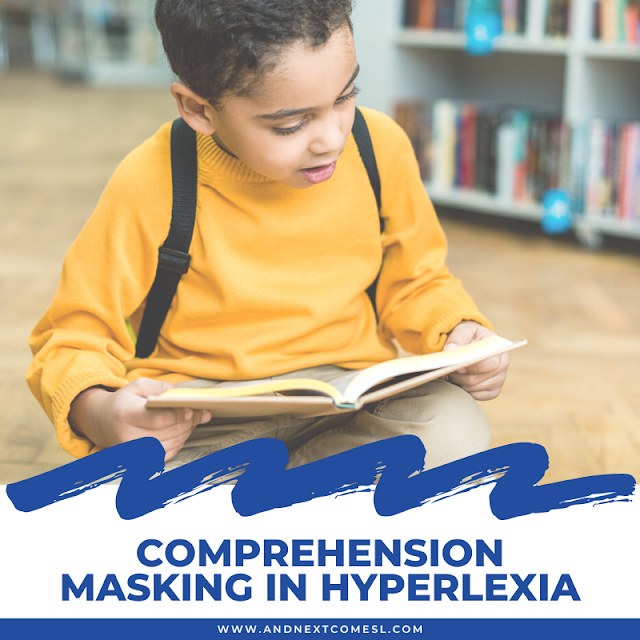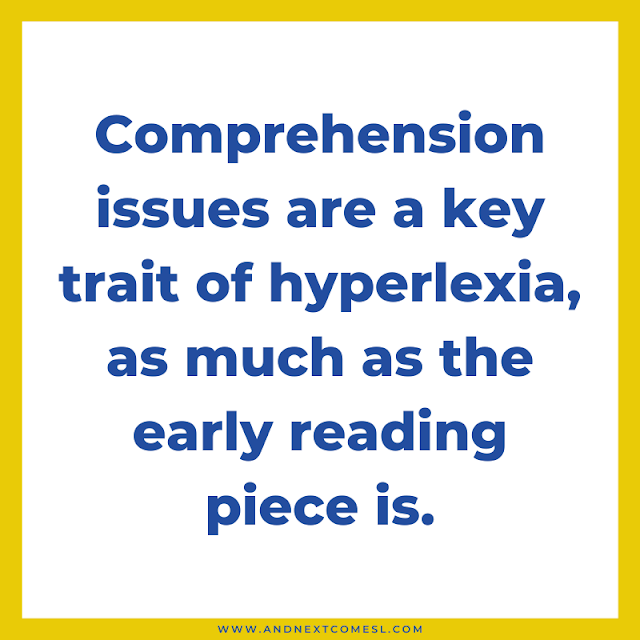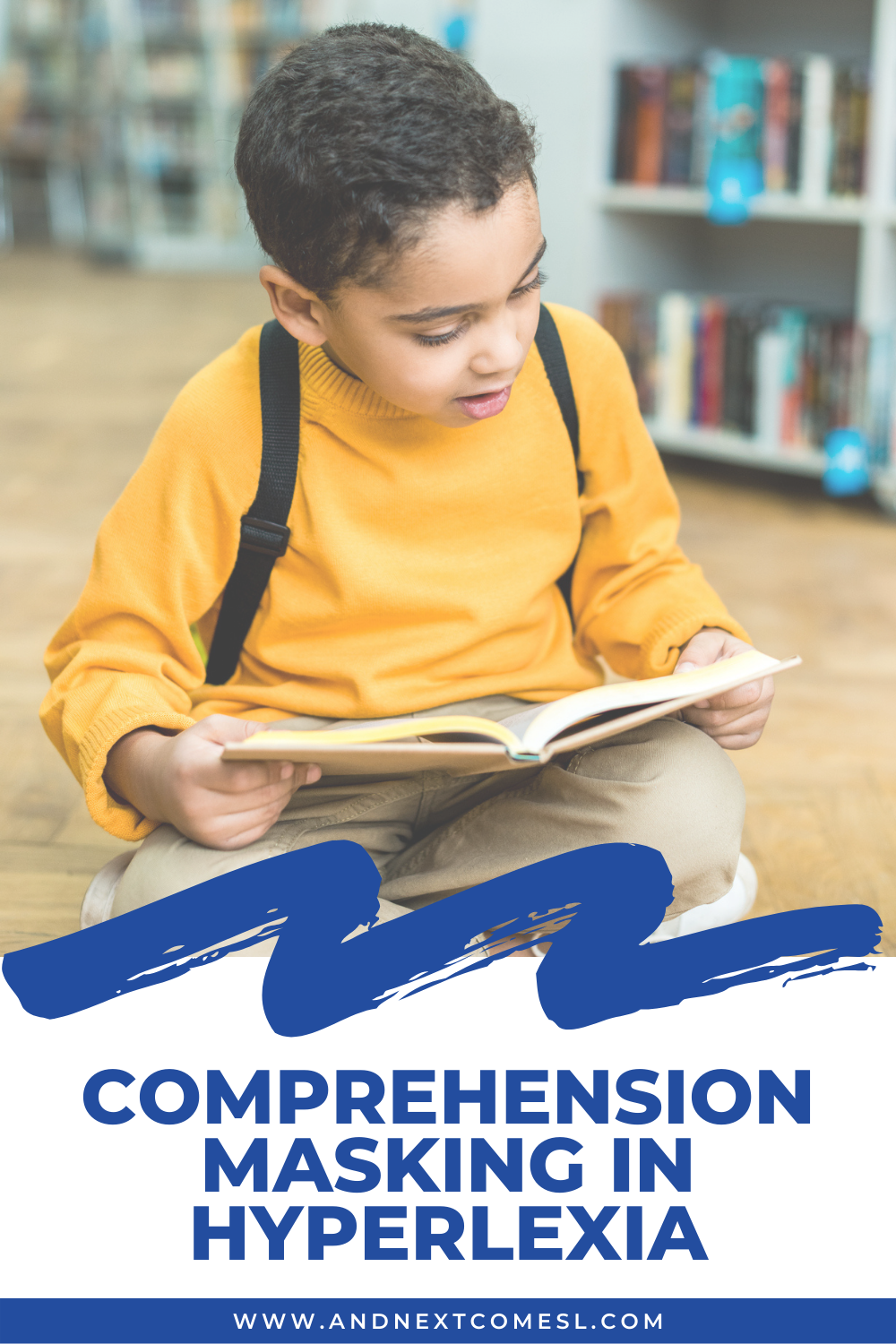Quite a few people have misconceptions about the comprehension issues that accompany hyperlexia. Even though it's a core trait that has been well documented in the research for the last 50-ish years.
Part of the reason that there are these misconceptions though is that our hyperlexic readers can be really, really good at masking - or hiding - their comprehension issues.
Their strength in decoding usually overshadows all of these other issues or weaknesses that are there, whether or not you see the signs yet. So while you might not see any obvious comprehension difficulties at age two or three, that doesn't mean you won't see these issues further down the line like at age 8 or 10 or 12.
So let's take a look at comprehension masking in hyperlexia and what that means.
Why it's Important to Understand Comprehension Masking in Hyperlexia
There are many well-meaning parents who argue that their hyperlexic child's comprehension is "fine" and others who flat out deny that there are bigger issues at play.
But the reality is that comprehension issues are a key trait of hyperlexia, as much as the early reading piece is. In fact, it's a core feature of hyperlexia that's been outlined even when the term hyperlexia was first proposed in the 1960s by Silberberg and Silberberg.
So to deny that there are problems with comprehension is to also reject the heart of what hyperlexia is. You can't accept that the definition of hyperlexia fits your child just by picking and choosing only certain characteristics. You must accept the whole definition. And that whole definition includes issues with comprehension.
In fact, "many argue that hyperlexia in young children is a red flag for future reading comprehension difficulties rather than a sign of advanced reading proficiency." (Robertson, 2019). Or, as Iland (2011) writes, "if a young reader is known to have hyperlexia, or if he has ASD and is a good decoder, parents and professionals should consider the child at risk for comprehension issues from the start."
In other words, the presence of hyperlexia also means the presence of comprehension issues. The two go hand-in-hand. The comprehension difficulties are also what separates a hyperlexic reader from a precocious one, by the way.
What makes things tricky though is that these comprehension issues in hyperlexia are often masked by their strengths or, as Robertson (2019) suggests is "overshadowed by precocious decoding skills." Essentially, "strong skills in some areas [are] masking weaknesses in others." (Iland, 2011)
As a result, many hyperlexic kids may "fly under the radar for a long time" (Iland, 2011) until, one day down the road, the comprehension issues rear their head in higher grades. As Robertson (2019) writes, "the comprehension deficit was there all along - hiding in plain sight but overlooked by parents and educators who may have been blinded by the students' early reading strengths."
So part of the reason why we need to discuss comprehension masking in hyperlexia is to highlight the importance of focusing on comprehension skills from a young age. Yes, even if your hyperlexic child's comprehension seems fine right now.
Because, like we've touched on above, these issues can be hidden, overshadowed, and masked, ultimately leaving the hyperlexic child lagging even further behind in their comprehension once they hit the higher grades. And, as a result, they might not get the support they need to succeed.
But how are these issues masked exactly? Well, that's what we'll explore next.
How Comprehension Issues are Masked by Hyperlexic Learners
In the book Drawing a Blank, Iland points out that hyperlexic kids "learned to compensate for their lack of understanding by using a variety of strategies and strengths." So their comprehension abilities can be masked by:
- Strong decoding and fluency skills
- How comprehension is measured
- Use of short or limited responses
- Good memory for specific facts
- Understanding of concrete content
- Incomplete or surface-level understanding
- Task demands that match the level of basic comprehension
- Being retaught at home or in tutoring
Robertson (2019) also noted that a hyperlexic child's comprehension skills can be masked by their:
- Exceptional visual memory skills
Hopper (2003) also discussed comprehension masking in hyperlexia and noted the following could be masking comprehension abilities:
- Choice of test instrument used
- How answers for some tests are echolalic in nature
- Using information verbatim from the text to answer a literal question
It's important to note that hyperlexic kids "can test in the "average" range on many types of language or academic tests, yet still have a comprehension problem" (Iland, 2011) because they've learned to mask their issues well. As Hopper (2003) points out, hyperlexic kids will continue to have these comprehension deficits, it's just that many tests can hide the fact that they're indeed struggling.
Some Final Notes on Comprehension Masking in Hyperlexia
You're probably wondering what's next. What can you do with this information? Well...
- Make note of the ways in which their problems can be masked and keep them in mind. Make sure teachers and therapists are aware of the possibility that the hyperlexic learner may mask their comprehension difficulties.
- Recognize that there are underlying comprehension issues that will appear eventually (usually the fourth grade is when these issues become quite noticeable) instead of minimizing or dismissing these issues because things seem "fine."
- Prioritize comprehension as soon as possible. Start building skills and supporting your hyperlexic learner with their comprehension.
Hopefully you've found this information about comprehension masking in hyperlexia helpful. I really encourage you to read the book Drawing a Blank for a more in-depth look at comprehension in hyperlexia.










